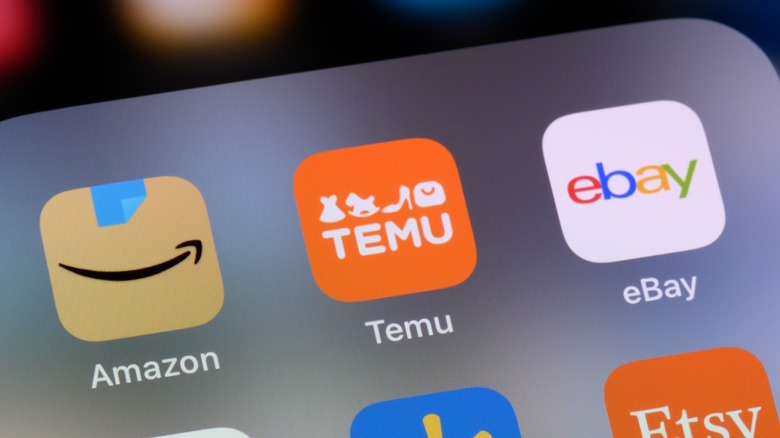Is Temu Safe To Order From? Here's What We Know
It seems that everywhere we go, we're paying more and more for everything. Even though price increases have slowed, it may be some time before many recover from the effects of the 2021 inflation spike. That's why websites like Temu are so appealing to consumers. They offer various goods at heavily discounted prices, allowing the dollar to stretch as it once did. Pricing is so good, in fact, that it feels too good to be true.
Is there something nefarious about Temu? Or is the online retailer the answer to consumer burnout in a post-COVID world, where hindered supply chains led to extraordinary prices for even the bare necessities?
With competitor sites like Alibaba and Shein making waves with headlines of child labor and harassment accusations, it's understandable that the public may be weary of a similar site. That uncertainty is only further exacerbated by comments made by the U.S. government, which constantly puts Chinese-based businesses under the microscope.
While the surprisingly lower prices and off-shore parent company can be red flags, they're not wholly indicative of a problematic shopping experience. In fact, as a whole, Temu is a legitimate business that does as advertised and is even proactive regarding scam prevention, as seen in a response to concerns raised by SlashGear writer Daniel Trock in October 2023.
However, it's worth digging a little deeper to further guarantee there are no underlying or hidden issues with the e-commerce app.
Who owns Temu?
Customers may be purchasing items off Temu, but beyond that, they likely have no idea where their money circulates once that "Place Order" button is pressed. The website gives no indication that an American company does not own it. In fact, all contact information leads to a Boston address and a Deleware-based company known as WhaleCo, Inc. However, when you follow the money trail, it ends at a company known as PDD Holdings, Inc., a multinational commerce group based in Shanghai, China.
PDD Holdings is also the parent company of an app known as Pinduoduo. If that's sparking any memories, it's probably because, in early 2023, Google removed Pinduoduo from its Play Store library after external versions of the e-commerce app were found to have malware built in. As of nearly a year later, the app never returned, but PDD did become the subject of an investigation by the Law Offices of Frank R. Cruz.
According to a press release on BusinessWire, in September 2023, Cruze spearheaded a class action lawsuit against PDD Holdings, Inc., citing "possible violations of federal securities laws." The release goes on to state that Grizzly Research, a short-seller that issues reports on publicly traded companies, called Temu "the most dangerous malware/spyware package currently in widespread circulation." As of February 2024, Cruz has yet to officially announce the suit against PDD, despite frequent updates on Twitter regarding other lawsuits.
Cybersecurity and Temu
Grizzly Research and Google incited concerns over Temu's backend cybersecurity risks, especially after Pinduoduo was removed from the Play Store. Eventually, the e-commerce app came under the watchful eye of the U.S. government, which had just launched a witch hunt to scrutinize TikTok and its Chinese roots.
Despite concerns from the United States — and a spectacle of a congressional hearing — chief information security officer at the Switzerland-based cybersecurity firm Acronis, Kevin Reed, was less doom and gloom about Temu. Though Reed did note Pinduoduo's excessive and somewhat unexpected 80-plus permissions, he confirmed that Temu isn't nearly as aggressive.
According to Reed, Temu only requests 24 permissions, and though Wi-Fi network information is among them, the vice president of security firm Arctic Wolf Labs, Daniel Thanos, sees no threat to U.S. users. In fact, Thanos states that the permissions mainly target devices typically sold in China, including Vivo and Xiaomi phones.
Despite the U.S.-China Economic and Security Review Commission's criticism of Temu, analysts remain unbothered by the shopping app. In fact, Lindsay Gorman, senior fellow for emerging tech at the German Marshall Fund, believes the real threat lies in social media platforms, which not only obtain more data than e-commerce apps via profiles and user behaviors but also can manipulate content dissemination and misinformation.
Can you feel comfortable ordering off Temu?
Even if Temu doesn't pose a cybersecurity risk, which some may still think is questionable based on the analysis that it isn't as aggressive as other platforms, there's still the matter of its consumer-facing practices. One big question is whether you actually receive the product you buy, and for the most part, you do.
As users note, you quite literally get what you pay for — cheaper and lower-quality products. One shopper spent $170 on 20 items, including a portable AC unit and assorted clothing. Of that haul, they were critical of several items but specifically recommended users avoid buying makeup and cautioned on clothing size discrepancies.
While no inherent or known danger comes with shopping on Temu, buyers should exercise some caution and be mindful of their personal comfort levels. The company has a C+ rating on the Better Business Bureau (BBB), with an average review score of 2.5 out of 5 stars. In a 12-month span, the BBB received just under 1,700 complaints about Temu since the retailer's launch in September 2022, with many pertaining to missing shipments. Maybe most surprisingly, though, is that Temu does respond and try to satisfy complaints.
When shopping on Temu, there's always a risk that the product you receive is of a much lower quality, but that is part of the territory of low-cost goods. When it comes to safety, though, Temu doesn't appear to pose any real risk.



